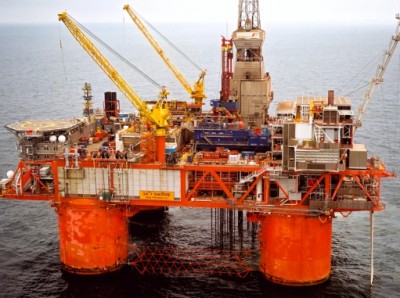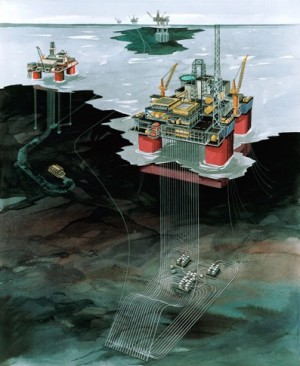Norway’s long-booming oil and gas industry suddenly seems to be facing new challenges on several fronts. A proposed tax hike for oil companies has sparked industry protests and worries industry analysts, while some investors warn that oil prices may dive, with “dramatic consequences” for Norway’s oil-based economy.

The looming “tax change,” which amounts to a tax hike for oil companies doing business in Norway, was announced by the government earlier this month. It will increase the companies’ revenues that are subject to tax, boosting oil tax revenues to the state by an estimated NOK 3 billion a year.
In a media briefing in Oslo on Wednesday conducted by research and consulting firm Wood Mackenzie of the UK, oil and gas industry analysts questioned the stability of Norway’s fiscal policy by introducing the higher tax, and suggested that the looming tax change “makes exploration less attractive.”
Malcolm Dickson, senior analyst in charge of upstream research at Wood Mackenzie, closely follows the Norwegian offshore industry and noted that Norway’s political stability has been one of its greatest strengths in attracting international oil companies. Norway “simply provides a more stable place to do business … with a very supportive government,” but now that support was in question. “What will scare companies away? The tax change raises uncertainty,” he said, adding that “our assumption is that it will go through. Marginal projects may be delayed or cancelled. We know (the tax change) is a big consideration for the companies.”

Newspaper Dagens Næringsliv (DN) reported on Thursday that the government parties that proposed the tax (Labour, the Center Party and the Socialist Left) are standing firm and they have a majority in Parliament. Helge Lund, the chief executive of Statoil, was initially denied even the opportunity to plead the oil industry’s case before the parliament’s finance committee. When he finally was allowed on Wednesday to present his objections to what the government merely calls a “tax change,” he failed to convince committee members that the government had underestimated the industrial consequences of higher taxes.
“Our main point has been the importance of a long-term and stable framework for an industry that invests towards a very long horizon,” Lund told DN. “That’s been Norway’s biggest competitive advantage for many decades.” Lund also fears the higher tax will affect production and the opening of new oil fields.
Lund claimed that the Snorre oil field in the North Sea, for example, will see its profitability reduced by 30 percent. The gas field Aasta Hansteen in the Norwegian Sea may see profitability cut by 70 percent and the gas field Bjarmeland in the Barents Sea won’t be profitable at all.
Politicians weren’t convinced. “No, we won’t be delaying the introduction of the tax proposal or changing it,” finance committee leader Torgeir Micaelsen of the Labour Party told DN.
Academic support
Lund, though, had support from two professors who wrote in a letter to the editor of newspaper Aftenposten on Thursday that accountants in the Finance Ministry have made some errors in their calculations of the effect of the tax increase on “Norway’s biggest and most important business.” Petter Osmundsen, professor of petroleum economics at the University of Stavanger, and Thore Johnsen, economics professor at the Norwegian business school NHH (Norges Handelshøyskole) in Bergen, also claimed that the tax increase “has created greater uncertainty than the ministry and politicians appear to have realized.” The portion of oil revenues not subject to tax (so-called “friinntekt”) will be reduced from 30 to 22 percent, they wrote, but the ministry may go further. “How much further,” they asked.
Economists predict more growth for Norway and at the Wood Mackenzie media briefing on Norway’s oil industry in a global context, analysts also remained bullish on Norway’s prospects despite the higher costs of developing fields. Norway must compete for capital on an increasingly global basis they noted, but Wood Mackenzie’s vice president of exploration Andrew Latham said he was “confident we’re going to see more growth. We should see the big guys (oil majors) spending more.” He called production levels “not spectacular, but healthy,” with exploration projects “still finding big volumes.”
Price dive fears
The Wood Mackenzie analysts see “moderation (a decline) in oil prices over the next few years,” while newspaper DN reported on Thursday that one of Norway’s wealthiest investors thinks oil prices may “dive” from today’s USD 103 a barrel to as low as USD 60-70, and his family is investing in US companies instead of Norwegian firms.
“We’d gladly invest more in Norway,” Dag Rasmussen, chief executive of the Kristiansand-based Rasmussen Group, told DN. “It’s a market we know well. But for us, the relation between risk and possibilities for gains are better in other markets.”
A fall in the price for Norway’s oil and gas will have “dramatic consequences” for the Norwegian economy, Rasmussen believes, “not just for the Oslo Stock Exchange and the oil service branch, but for the mainland economy and housing prices.” If production from shale gas and oil projects in the US continues to climb, and the US becomes more energy self-sufficient, it’s “not unthinkable” the oil price will fall to USD 60-70. “It’s far from certain, but it can happen,” Rasmussen told DN.
Views and News from Norway/Nina Berglund
Please support our news service. Readers in Norway can use our donor account. Our international readers can click on our “Donate” button:

